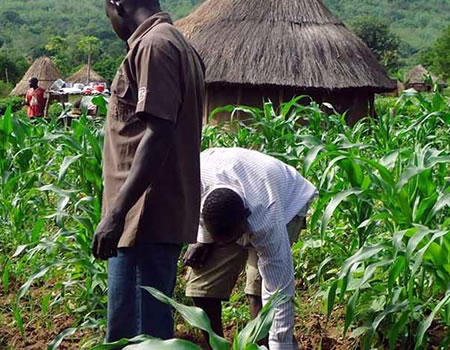Smallholder farmers in Nigeria are set to be empowered to the tune of $2 billion by the New Partnership for Africa’s Development (NEPAD).
National Coordinator of NEPAD, Princess Gloria Akobundu stated that the earmarked sum was to help boost food sufficiency in Nigeria for local consumption and export.
She spoke on Tuesday in Abuja at the Summit and Technical Engagement Roundtable on the project “Innovative Strengthening of Small Holder Farmers Capabilities Toward Productive Land Restoration Amid COVID-19 in Nigeria”.
Akobundu said it would be done in partnership with African Union Development Agency (AUDA), Central Bank of Nigeria (CBN), Federal Ministry of Agriculture, state governments, local government areas, traditional institutions, and other relevant stakeholders.
“We have already taken off; NEPAD is known for partnership and we are using the bottom-top approach to hunger to mitigate the COVID-19 effects and ensure employment for our youths and women.
“President Muhammadu Buhari has made a commitment to lift 100 million Nigerians out of poverty and this programme is one of the strategic moves to achieve that.
“We are partnering with states and traditional councils to ensure the grassroots are carried along,” she said.
Read Also: Buhari reveals when land borders will be reopened
According to the NEPAD boss, the project has 22 pilot states and is still open for others to join.
“However, there are guidelines, like availability of lands, counterpart funding and domestication of the project with a university or college of agriculture in the state for sustainability.
“So, we are taking the initiative to ensure proper food sufficiency and eradicate hunger from Nigeria, West Africa and Africa in general.
“On how much it will cost, we are looking at two billion dollars and we are taking it phase by phase. You can see that all the 22 states are ready and committed,” Akobundu said.
The NEPAD boss explained that Nigeria spent about six million dollars on importation of food annually.
She stressed the need to carry along rural farmers who were the best food providers for the country as Nigeria did not have adequate food companies.
Similarly, Mr Mamadu Diakhite, Head of Food Security Unit, AUDA, said the agency and NEPAD Continental were thinking of how to bring support to small farmers and boost food production at the grassroots.
“We know that for this type of project to succeed, we need the state governments to own it. So we decide to bring the governors who are owners to show their level of readiness to other countries and ECOWAS.
“We are starting with Nigeria because the governors have shown commitment by allocating lands for the small holder farmers to increase production.
“This programme is implemented by Intercontinental Initiative which is called Africa Forest Restoration Initiative. It was signed by Nigeria and 30 other African countries.
“The aim is to restore 100 million hectares of degraded land and forest by 2030. It is called ARR100. It is a partnership that helps bring soil fertility to be arable so that it can produce enough food for the population,” Diakhite said.
Also speaking, Alhaji Dandustse Mohammed, Chairman, House Committee on Agriculture, said the house would do the needful in passing any law that would enhance food production in the country.
States that have keyed into the project include Kwara, Yobe, Katsina, Ekiti, Adamawa, Delta, Sokoto, Imo, Plateau, Nasarawa and Kano.
Others were Ebonyi, Kebbi, Akwa-Ibom, Gombe, Bauchi, Borno, Benue, Kaduna, Ondo, Zamfara, Niger and Enugu.
NAN also reports that all the states made presentations showcasing their potentials and readiness to implement the project.

